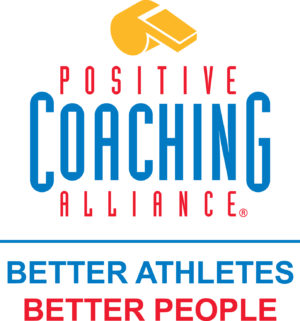
The Double-Goal Coach®
The coach who strives to win while also pursuing the more important goal of teaching life lessons through sports.
Double-Coach Goal® Job Description
Coaches play an incredibly influential role in the lives of athletes. Often players spend more time with their coaches than anyone else outside of the home environment. Therefore, it is important that school and youth sports organization (YSO) leaders and administrators take care in setting standards of success for the coaching staff, especially when hiring 1st-time coaches.
At Positive Coaching Alliance, we believe these standards are reflected not just on the scoreboard. While winning is important, it is more important that coaches teach life lessons through sports. We consider a coach that focuses on both of these outcomes to be a Double-Goal Coach®.
A school or YSO where every coach is a Double-Goal Coach will almost certainly find success. Coaches will model and teach players respect through Honoring the Game. Players focus on mastering their sport, which leads to higher effort, learning and improved athletic performance. Athletes also will also have more fun and feel good about what they are accomplishing because coaches are empowering them with positivity as they fill their Emotional Tanks.
ELM Tree of Mastery
There are two ways to win and feel successful in sports. The way we typically think of winning, Scoreboard Winning, means that we have outscored our opponent. The other way to win and feel successful is to take a Mastery Approach. This type of winner focuses on effort, learning, and recovering from mistakes. Being a mastery winner is more important, more satisfying and should be the end goal. Positive Coaching Alliance uses an acronym, ELM (Effort, Learning, Mistakes are OK), to keep coaches, athletes and parents mindful of a Mastery focus.
Effort is an important measurement for success because it measures what you can control, instead of focusing on what’s out of your hands. If an athlete or team is giving their best effort at practices and games, then they are working toward mastering their sport and that is a win. A team that loses on the scoreboard with maximum effort can still take pride, while a team that wins on the scoreboard but didn’t try hard might not feel as satisfied.
Coaches should emphasize learning as a core goal during practices and games. Players who learn new skills and talents are en route to mastering their sports. Winning on the scoreboard can be a byproduct of players learning and improving.
Finally, assuring players that mistakes are OK will free them to pursue more learning and improvement. Athletes who are afraid to mess up will never feel comfortable trying something new or adjusting to changes as they occur in sport. To help players recover from these mistakes, coaches can also develop a mistake ritual to help them move forward and focus on the most important play – the next play.
Filling Emotional Tanks
When players feel supported by their coaches and teammates, they are more likely to have fun and be successful. Supporting players includes continuously and positively reinforcing their efforts so that they are emotionally ready to bounce back from mistakes and to cope with difficult situations.
At Positive Coaching Alliance, we call this “Filling the Emotional Tank.” A player with a full tank will be ready to deal with most situations and will more likely have fun and therefore want to stick with youth sports. A player with an empty tank might struggle when constructive feedback is given and could feel deflated easily.
Coaches are encouraged to set team standards for support.
Honoring the Game
Learning from sports goes beyond skills and tactics on the field. Coaches have a responsibility to the players and parents that they’ll help develop better athletes and better people. In that light, teaching respect and sportsmanship is a crucial aspect of coaching.
Learning and appreciating the value of respect will positively impact a young person’s life. It’s not only an important skill to have for a successful life, but it will lead to a more positive experience for all the players, coaches, parents, officials and fans involved with your school or youth sports organization.
At Positive Coaching Alliance, we call this Honoring the Game. Encouraging everyone involved to Honor the Game will raise the standards for appropriate behavior and will hopefully eliminate negativity that doesn’t belong in sport. Almost everyone has heard stories of parents yelling, kids acting inappropriately or coaches disagreeing with the officials. This behavior takes away from the bigger picture of playing sports. When those involved show they respect all aspects of the game, they are raising their experience beyond a win or a loss, and learning important life lessons that can turn them into better people.

